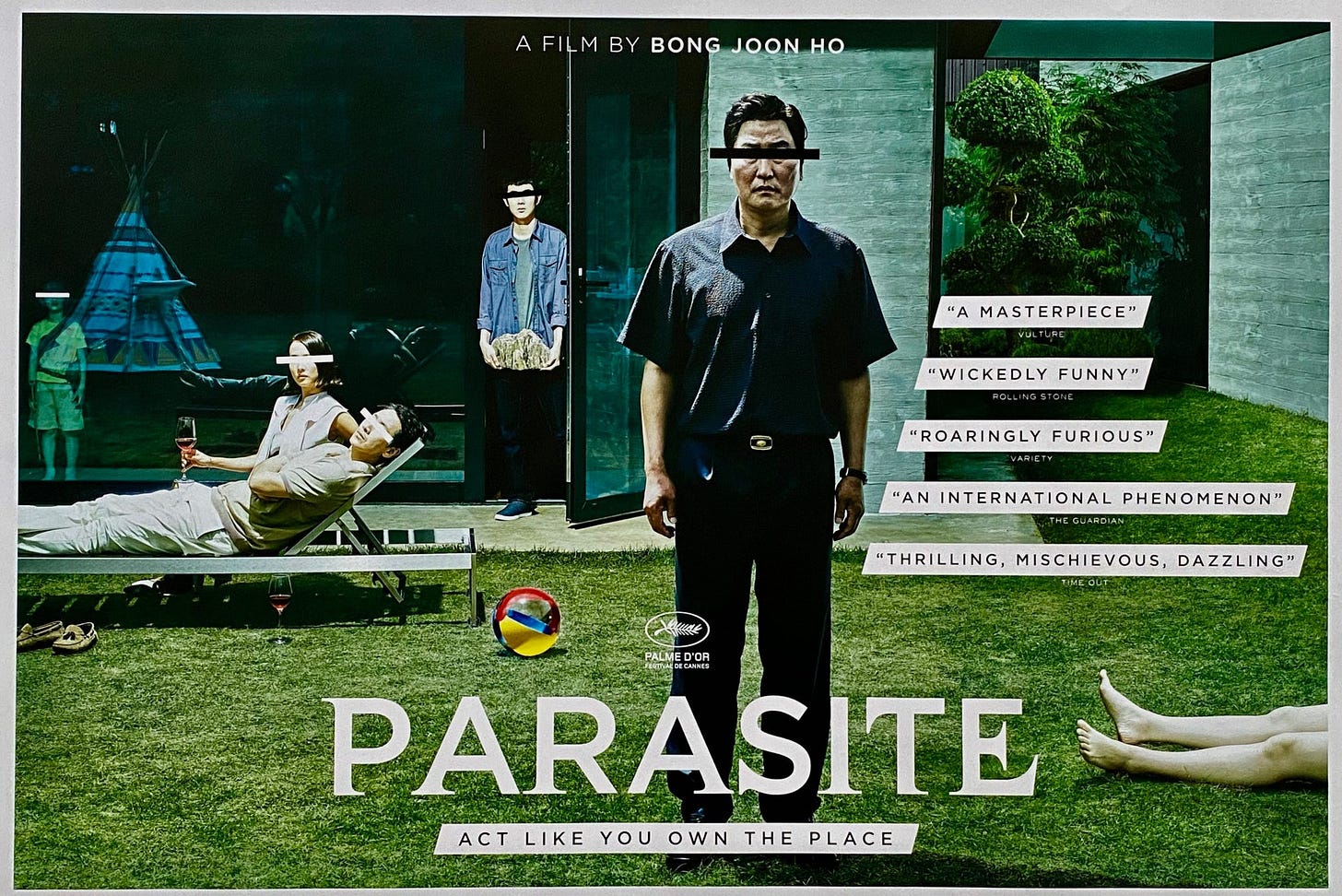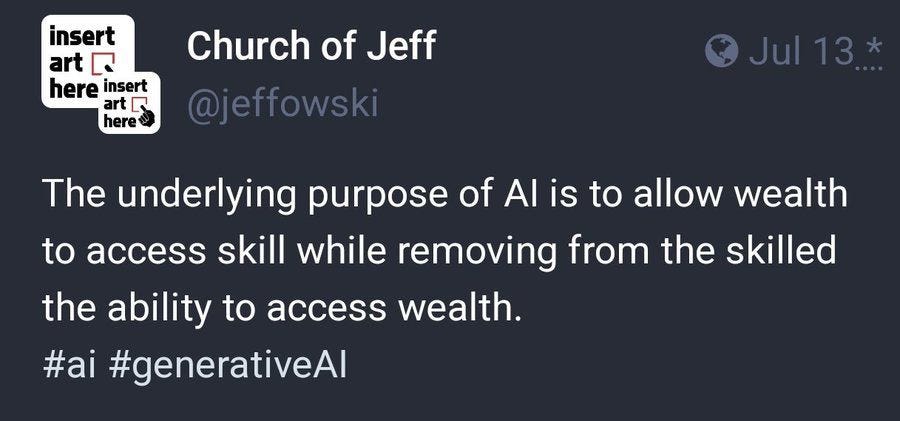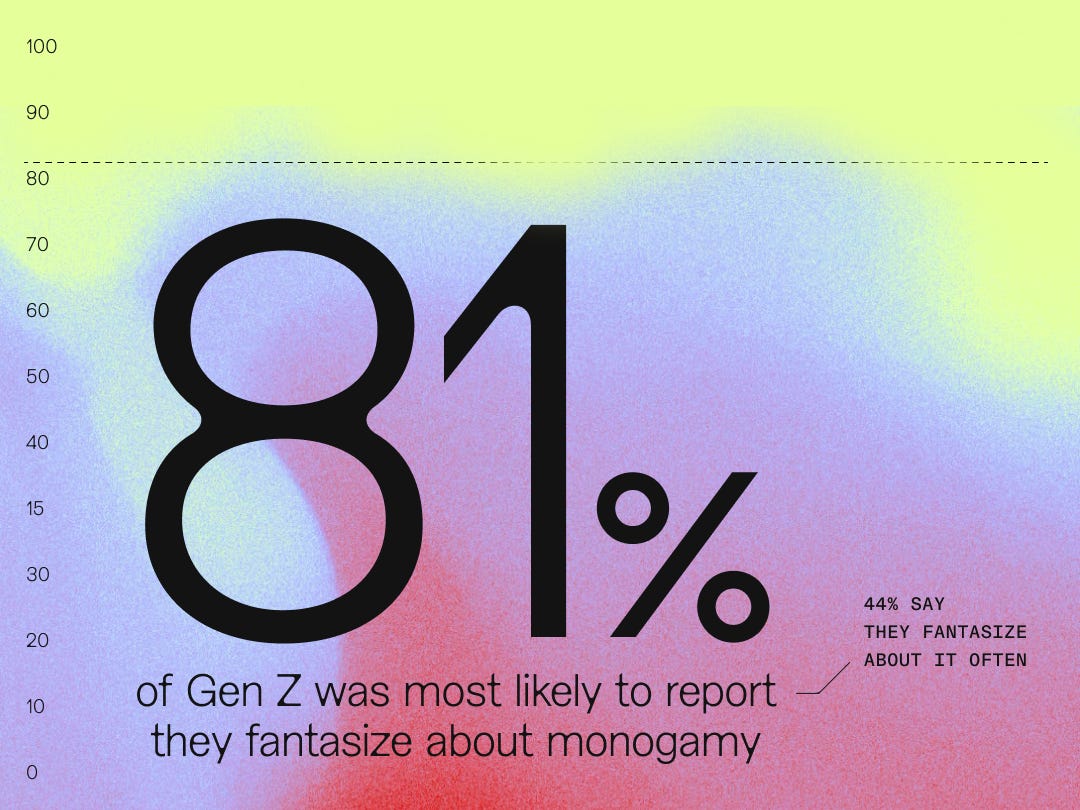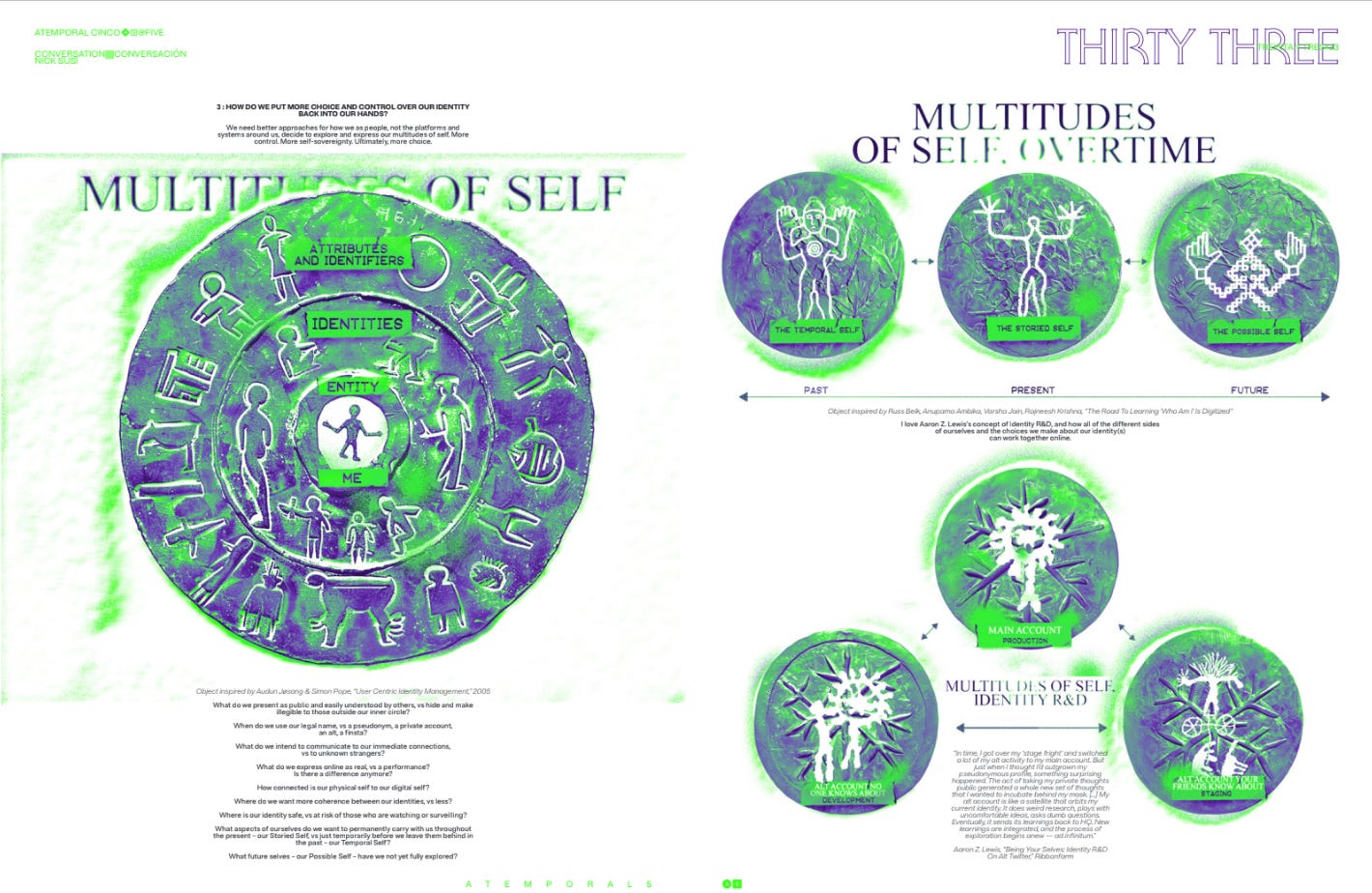👔✨The Nexialist #0191
parasite culture | the fordian slip | eusexua | chama | the state of dating | digiphrenia | hoardiculture | dumpster archeology | breathing anus? | ig nobel prize
welcome to your weekly out-of-office curatorship, the nexialist
hey, you! i hope this e-mail finds you well serving eusexua like fka twigs above (more on that later). apparently, the cucumber time (tn#185) is over, as things seem to be picking up again. i’ll not extend myself in the intro, as you’ll see this week, the post is quite extended. i hope you enjoy it 🫀✨
1 year ago » 🫦✨The Nexialist #0139 : pretty baby | the perpetual infantilisation of millennial women | ella tiene | callipygian | erotic electronic | slut techno | (masturbation) data is beautiful
2 years ago » 🫠✨The Nexialist #0087 : The Creative Process | Chatter Toolkit | Parkinson’s Law | The Big Map of Forbidden Information | The Art of Illusion | The Big [Censored] Theory | A24’s Gift Shop | E-motions | Viola Davis
3 years ago » 🎁✨The Nexialist #0038 : The Perfectionism Trap | Normosis: The Pathology of Normality | Social Cooling | Solar Power | Artist Imperfection
🦠parasite culture
in my house we like to make the joke that our cat, donirene, is a parasite. she loves being on top of us, and as soon as someone needs to go on with their day, she goes on to look for a new host. this, of course, is the cutest example of a parasite you can find, but this piece by
talks about something not so cute: are we now living in a parasite culture?Nowadays, parasite businesses are the largest corporations in the world. Their technologies do many harmful things, but lately they have focused on serving up fake culture, leeching off the creativity of real human artists.
Just take a look at the dominant digital platforms—and consider how little they actually create. But the amount of leeching they do is really quite stunning, especially when compared with the dominant businesses of the past.
while this has probably been said before (maybe karl marx said that?) i’m all here for reframing corporations (and billionaires since we’re at it) as parasites in our system.
you’ve probably seen that slide present in every innovation deck from a decade ago: “Uber, the world’s largest taxi company, owns no vehicles. Facebook, the world’s most popular media owner, creates no content. Alibaba, the most valuable retailer, has no inventory. And Airbnb, the world’s largest accommodation provider, owns no real estate.” well… at the time it was talking about disruption and selling us a promising sharing economy, now we see how it was foreshadowing the extractivism of these platforms.
in the end of the article, ted looks at the ai boom. “It’s no coincidence that these parasite platforms are the same companies investing heavily in AI. They must do this because even they understand that they are killing their hosts.” he ends the article with some ideas of solutions, but it doesn’t feel like fair game at this point. then this tweet was shared at the
group and stayed in my mind.brainsparks: the other vibe shift (tn#102), technofeudalism (tn#143), netocracy vs consumtariat (tn#18), self-fulfilling cyberpunk (tn#127)
🚙the fordian slip
this essay by stephanie sherman for e-flux is a gem: the fordian slip. i find this piece of history fascinating and absurd: “In 1927, Henry Ford bought a tract of land twice the size of Delaware in the Brazilian Amazon.” Fordlandia is its name, sounding to me like fairy tale meets cyberpunk, but it’s a real story about the length corporations will go in order to dominate and extract to make their machines work. sherman lays out how ford had a prolific and very well functioning “planetary engine” with its many moving pieces.
Fordism describes the paradigm of economic, social, technological, geopolitical, and cultural logics set in motion by Ford’s internal combustion empire. Fordism is broadly critiqued for its rigid vertical hierarchy, its extractive emphasis on capital surplus accumulation, and the tight rationalization of production that ultimately led to its demise.
however, sherman shows us how fordism actually had its success due to flexibility and adaptation in its global platform. up until that point. fordlandia became a cautionary tale of how platforms must culturally adapt and listen to the experience of those who were there (among many other things). fordlandia is worthy of a limited series and it’s one of the few battles where colonialism lost.
At first, tappers arrived in droves. But the rote overprescription of labor protocols from the Fordist factory, so successful in Detroit, prohibited intelligent adaptation to this new location. Social control took precedence over successful capital production. The previous labor regime had paid workers per harvest bucket, and tappers worked in the mornings and evenings, efficiently avoiding the peak jungle sun. The Ford managers insisted on applying the American formula of continuous eight-hour workdays under the sweltering Amazonian heat, pushing workers to exhaustion. The once uneven and interspersed forest of Hevea rubber trees was replaced with monocultural rows, which accelerated the transmission of disease. The prefab, suburban style housing imported from Michigan let in bugs and heat, proving far inferior to the thatched-roof architecture perfected over the years by indigenous tappers. The American managers prescribed a missionary spirit, insisting the tapper communities participate in English sing-a-longs, square dancing, and the cultivation of small garden plots. Hammocks were prohibited, and fainá, the local cornmeal staple, was banished from the Fordlandia workers’ cafeteria. Alcohol was banned from the company town, a rule that the company managers visibly ignored. In response, the tappers established their own “island of innocence” on an islet across the river, a jurisdiction for revelry and pleasure just a short boat ride away.
via the syllabus
brainsparks: the brazilianization of the world (tn#35), reindigenisation x decolonisation (tn#140)
👔eusexua
fka twigs is one of those artists that prove we are living in the most creative time ever (tn#183). she is a master at worldbuilding and her dedication to her art is just out of this world (when i saw her live i was sobbing by the end of her concert). she has this magnetism that makes me stop, pay attention and feel things.
i love the how she the hypnotizing choreo starts glitching the uniformity and boredom of corporate aesthetics, bringing us to this parallel reality. i can’t wait for what’s coming.
eusexua is a practice
eusexua is a state of being
eusexua is the pinnacle of human experience
brainsparks: irregular report: work (tn#133)
🫄chama
arca & tokischa’s new video could be in the same universe as eusexua (and were both released on the same day, friday 13th). the weirdness, the glitches, the audiovisual trip it takes us. i mean, two pregnant mothers twerking in a dark forest, dancing with a cobot arm, giving birth to light, what else do i want?
brainsparks: the most creative time ever (tn#183), relearning fertilization (tn#28)
🫀the state of dating
“What you want will surprise you.” that’s the title of the post summarizing the report about the state of dating by feeld, dr justin lehmiller and the kinsey institute. it has appeared in different places for me with the shocking paradox that gen z is the generation that fantasizes more about monogamy while simultaneously being more kinky and open to kinks than other generations.
the report has some critical and interesting insights, but i could not not think of a couple caveats. the +3.3K respondents are feeld users, an app that has become the place to go for to those exploring non-monogamy and kinky practices: “Feeld is a modern dating app for the curious, and for those seeking to express and explore their sexuality outside of established blueprints.” also, 65.3% of respondents identified as male, which reminded me of the political divide/gap where women are increasingly progressive and men increasingly conservative. so i do think this influences the results we see.
in the post they explore some hypothesis on why gen z has this fascination with monogamy and it’s quite interesting (feeld is actually making pretty cool content i just realized): they want what they don’t have. since they haven’t had a serious relationships (think of situationships (tn#86) + risk-aversion (tn#168), they have this fantasy. they also tend to romanticize what monogamy and traditional roles could bring them, especially in the complexities of cyber-physical dating.
brainsparks: linear opposites or closely related? (#126), non-monogamy (tn#6), bdsm test (tn#6), on heteropessimism (tn#174), social health (tn#179), ai and the future of sex (tn#190),
👾digiphrenia
what a blessing to find this zine online: Atemporal zine. i didn’t know about it, but now i’m a fan (also, so nice to see such a beautiful bilingual project).
nick susi’s essay, the multitude of self, is full of contemporary wonderings about identity in the digital age. after being diagnosed with cancer, he started questioning how he would talk about this online, with the fear of becoming “the cancer guy” as the internet often makes us do. we were promised new ways of exploring our identities, but the reality is quite the opposite.
As human beings, we are multitudes. We have many sides to our identity – the elements that define and distinguish our sense of self. As futurist Tracey Follows describes, we are prisms.
The supposed promise of the internet has been that we can explore, discover and fully crystallize our identities into these unique, multi-sided prisms in ways that we never could IRL. We could become anyone. Or, more importantly, we could be anyones – intricate identities with limitless depth and surfaces reflecting pieces of ourselves back into the world.
In reality, however, the systems we live within — both algorithmic and societal — often push us towards the opposite. Our identities become compressed into one thing – the grieving parent, the cancer guy. We are forced to pick a singular lane and consistently craft our personal brand, package ourselves into a product and appease the repetitive, insatiable appetite of the algorithm. If we do this successfully, we can grow our audience and reap the rewards of financial and social capital.
i also learned a new concept that i had to share here. i appreciate how nick sews together references from theorists, philosophical movements and contemporary thinkers. this is one of the terms i learned and needed to share:
It leads to Digiphrenia – all credit to
for putting me on to this concept. The term, coined by media theorist Douglas Rushkoff, is derived from digi for “digital” and phrenia for “the disordered condition of mental activity.” By creating infinite identities, our fractured attention leads to infinite information overload, ultimately sacrificing our ability to truly connect and be present with the people around us.
it’s worth mentioning, this link was shared in
’s hoardiculture collections, which hasn’t left my mind since i learned the term:“Hoardiculture: Collecting so much junk there are piles of random shit cluttering everywhere possible and then claiming it’s a cultural trend.”
brainsparks: back to the future: identity (tn#34), context collapse (tn#25), channel drift (tn#60), new words for new worlds (tn#111), content capital (tn#96)
🗑️dumpster archeology
i grew up in a household where my mom would say: one man’s trash another man’s treasure. she is still known for finding pretty nice things that didn’t serve someone anymore. i’m glad to say i have found some pretty nice pieces of furniture in amsterdammer trash, so of course, i had to play this short film and i’m surprisingly pleased.
Self-proclaimed "Dumpster Archeologist" Lew Blink embarks on thrilling expeditions through dimly lit alleys where every item holds a story waiting to be brought to life. Through his eyes, the trash-strewn landscapes transform into an endless playground of mysteries waiting to be unraveled, inviting us to ponder the value of privacy and the impact of excessive waste while marveling at the wondrous stories within the refuge left in the alleyways.
there is even an ethical questioning around privacy: is it still private after it’s thrown away, or does it become public? it’s crazy that in the comments you can see at least one person who is not happy about this. imo, who is going to tell them big tech is making money off their data? this guy is just collecting stories (and i hope that that’s it, ofc).
brainsparks: keys to the city (tn#123)
🌬️breathing anus?
the ig nobel prize is “for achievements that first make people laugh, then make them think,” which is exactly the type of nexialist worthy content. i’ve had the link to the ig nobel prize for months and never found the right moment. well, now the 2024 winners it’s the perfect excuse for sharing. well, it turns out mammals can breathe through their anuses, and i’m just speechless. you can see all the other winners here.
In a stark demonstration of how award-winning breakthroughs can come from the most unlikely directions, researchers have won an Ig Nobel prize for discovering that mammals can breathe through their anuses.
After a series of tests on mice, rats and pigs, Japanese scientists found the animals absorb oxygen delivered through the rectum, work that underpins a clinical trial to see whether the procedure can treat respiratory failure.
brainsparks: why do we have butts (tn#27), callipygian (tn#129)
see you next week, eusexual beings 🫀✨
❓Wait, what is a Nexialist?
🔎If you want to see what I’ve already posted, visit the archive and use the search engine. Even I do that a lot.
💌I want to know what you think/who you are! Your feedback is highly appreciated; you can e-mail me or fill in this short survey. Thank you! 🙏🏻
🔌Let’s Collab?
I truly believe innovation comes from bringing improbable areas together, and that’s why I called this project The Nexialist. Some sectors are known to be self-referencing and hermetic. Sometimes, teams are on autopilot mode, focused on the daily grind, which hinders innovation. As a Nexialist, I like to burst these bubbles, bringing references from different areas, and maintaining teams inspired and connected to the Zeitgeist.
I offer inspiration sessions called Brainsparks, creative desk research (Zeitgeist Boost), Plug’n’Play deals for workshops and sprints, and other bespoke formats. If you want to know more about this, send me an e-mail with your challenge(s) and we can figure something out together. Check out my website and some work I’ve done below:









Beautiful mix, thanks Rodrigo!